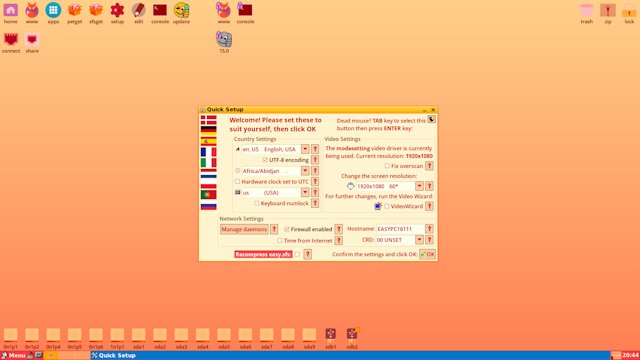Easy-Slackware 15.0 RC1 experiment
A couple of intense days getting there, finally booted "Easy
Slack" to a desktop, built from Slackware 15.0 RC1 binary packages. A
snapshot:

After all that effort, have decided to take it no further. Various reasons...
Slackware is supposed to be "lean and mean" and I expected the final
easy-*.img.gz file to be small, at least smaller than the Easy-Buster
Debian-based build. But, it is 610MB, bigger.
The Slackware repository is quite small. SalixOS have some extras,
but important packages are missing, such as LibreOffice and Inkscape.
Perhaps they intend to add them?
To fill the gaps of missing packages, I used some from Easy
Dunfell-series, those compiled by me in OpenEmbedded. But ran into
library version hell. Simply creating symlinks to libraries of a
different version is very iffy.
Anyway, got a desktop, wifi works. Sakura terminal works, but the
"back arrow" key deposits strange characters on the screen. Perhaps
because sakura is from Dunfell and vte is from Slackware repo, with a
vte library version mismatch.
urxvt aborts at bootup. LibreOffice also aborts at bootup, with a
very strange message about the boost library -- another version
mismatch. One good thing SeaMonkey is in the Slackware repo and it
works.
So, why bother? Easy-Dunfell works fine, so cannot see any reasons for changing.
Ditto for Easy-Bullseye, built from Debian packages. That has some
very odd issues, that I didn't entirely fix. For example NetworkManager
reports wifi device not ready, even though it is. Dbus is behaving very
strangely.
I will just keep on improving the Easy Dunfell-series.
Interesting orange-peach colour scheme. That was in the Quirky
Slackware 14.2 build, from many years ago. I used that as the starting
point, so that is where the colour scheme comes from. Started off with
the package-list used in the 14.2 build, then had to keep on adding more
and more packages as I chased the dependencies. Some packages, such as
ffmpeg, specify dependencies that don't exist in the repo.
Tags: easy
